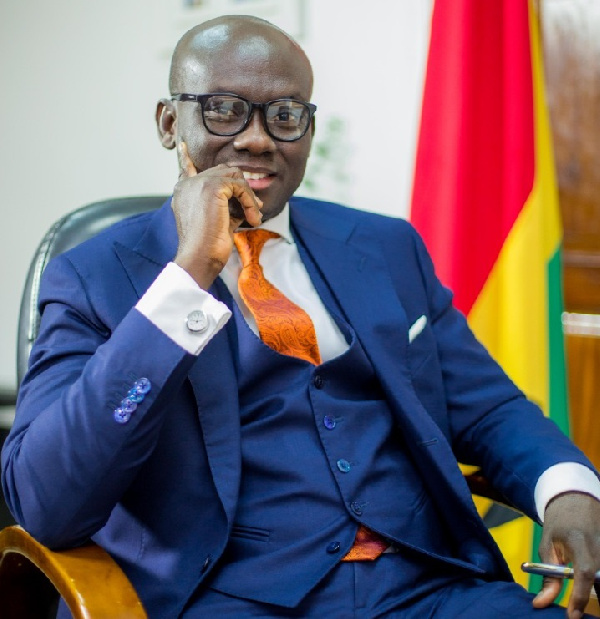The Attorney General (AG), Godfred Yeboah Dame, has told the Supreme Court that its 3:2 majority decision that prohibited Justice Clemence Jackson Honyenuga, from continuing with the case of the Republic versus Stephen Kwabena Opuni, Seidu Agongo, and Agricult Ghana Limited, contained fundamental errors that occasioned a miscarriage of justice, and therefore ought to be reviewed.
In his statement of case filed at the Supreme Court registry on the 18th of August 2021, the Attorney General invites the Supreme Court review panel which is expected to hear the case on Tuesday the 12th of October 2021, “to make a deep introspection into the soundness of the decision of the Court dated 28th July, 2021 and correct the errors contained therein”.
“The Court ought to be guided by the simple question whether the impugned decision, on account of the multiple legal flaws, leads to a miscarriage of justice in the case pending at the High Court” the AG’s statement of Case read.
28th July Decision
On the 28th of July 2021, a five-member Supreme Court panel presided over by Justice Jones Dotse, and made up of Justices Gabriel Pwamang, Agnes Dordzie, Avril Lovelace -Johnson, and Issifu Omoro Tanko Amadu, in a 3-2 majority decision, granted an application by Stephen Kwabena Opuni, that invoked the supervisory jurisdiction on the Supreme Court, seeking orders in the nature of certiorari to quash parts of the submission of no case ruling of the trial judge which expunged exhibits 58,59, 60,61, 62, 63, 64, 65, 66, 67, 68, 69, 71, 72, 73, 74 and 75, as well as an order of prohibition to prohibit the trial judge (Justice Clemence Jackson Honyenuga) from further hearing of the case.
Accused/Charges
Stephen Kwabena Opuni, former Chief Executive officer of the Ghana Cocoa Board (Cocobod), Seidu Agongo, managing director of Agricult Ghana Limited, have been charged by the State and are currently on trial before the High Court (Criminal Division 1) on 27 counts of abetment of crime, namely defrauding by false pretence, wilfully causing financial loss to the state, contravention of the Public Procurement Act and corruption by a public officer.
AG’s Grounds
The Attorney-General not satisfied with the decision of the Supreme Court and expressing the sentiment that the decision worked injustice against the State, filed a review application before the Supreme Court, canvassing four (4) main grounds in support of his application.
First, the Attorney General contends that “the decision of the ordinary bench of this Supreme Court dated 28th July 2021 contained fundamental and grave errors which have manifestly resulted in a substantial miscarriage of justice, as it effectively ignored the time-honoured fundamental and mandatory preconditions for an invocation” of the Supreme Court’s “supervisory jurisdiction for an order of certiorari to quash an alleged error contained in a decision of a Superior Court”.
Secondly, the Attorney General argues that “a decision which erroneously departs from recognized principles regarding the invocation of this Honourable Court’s supervisory jurisdiction is bad in law, works manifest injustice and constitutes an exceptional circumstance warranting a review by the Court”.
Third, “that the ordinary bench committed a fundamental error resulting in a substantial miscarriage of justice when it wrongly construed sections 118 and 126 of the Evidence Act, 1975 (NRCD 323) on the law on hearsay evidence. The effect of the erroneous construction of sections 118 and 126 of the Evidence Act was to, without compelling reasons, change the law on hearsay. This constitutes an exceptional circumstance resulting in a gross miscarriage of justice”.
Lastly, “that the ordinary bench committed a fundamental error in prohibiting the trial judge who rightly performed his duty as required by law to evaluate the evidence adduced by the prosecution in order to make a determination whether a prima facie case had been made against the respondent. This error has occasioned a substantial miscarriage of justice”.
Concluding Argument
The Attorney General concludes his statement of case by indicating that, “it is our humble submission that a careful application of relevant principles regarding the invocation of both the supervisory and review jurisdictions of the Court will undoubtedly result in a setting aside of the decision complained of. To preserve same will be a bad and dangerous precedent for Ghana law”.
Background
After more than two years of trial, the prosecution in the case of former COCOBOD CEO Dr. Stephen Kwabena Opuni and businessman, Seidu Agongo, on the 29th of March 2021, closed its case against the accused persons.
The accused persons have been on trial at an Accra High Court since March 2018, charged with 27 counts, including causing financial loss.
The prosecution led by the Director of Public Prosecutions (DPP), Yvonne Atakora Obuobisa, called seven witnesses to prove the charges against the accused persons who were extensively cross-examined by defence lawyers, some spanning about six months.
The prosecution, at the end of the cross-examination of Chief Inspector Thomas Prempeh Mercer, the investigator, on 29th March 2021, ended its case.
Dr. Stephen Opuni and Seidu Agongo, Managing Director of Agricult Ghana Limited, are on trial for allegedly causing financial loss to the state to the tune of two hundred and seventeen million, three hundred and seventy thousand, two hundred and eighty-nine cedis (GH¢217,370,289.22).
They have been accused over the purchase and supply of Lithovit fertilizer, which the state submitted was done in contravention of several laws.
The two pleaded not guilty to all the charges and were admitted to self-recognizance bail in the sum of GH¢300,000 each by the court at the beginning of the trial.
According to the facts of the case, Dr. Opuni on October 10, 2014 whilst he was the CEO of COCOBOD agreed to permit his conduct to be influenced by an amount of GH¢25,000.
His co-accused, Mr. Agongo, has also been accused of “endeavouring to influence the conduct of Stephen Kwabena Opuni in the performance of his duties as the CEO of COCOBOD by offering him an amount of GH¢25,000” on October 10, 2014.
One of the main issues in the trial is the nature and form of the Lithovit fertilizer that was introduced and supplied to COCOBOD for distribution to farmers, being different from what was tested by the Cocoa Research Institute of Ghana (CRIG).
While witnesses of the prosecution have all insisted that the product that was tested and certified was powder in form, there are records pointing to the fact that COCOBOD, under the management of Dr. Opuni, procured Lithovit liquid fertilizer which was never tested by CRIG, according to the prosecution.
The investigator during his evidence in chief told the court that investigations by the FFU revealed that in 2013, Agricult Ghana Limited, through its CEO, introduced Lithovit foliar fertilizer which was in powdered form together with its Material Safety Data Sheet (MSDS) to COCOBOD which on May 15, 2013, was forwarded to CRIG for testing.

